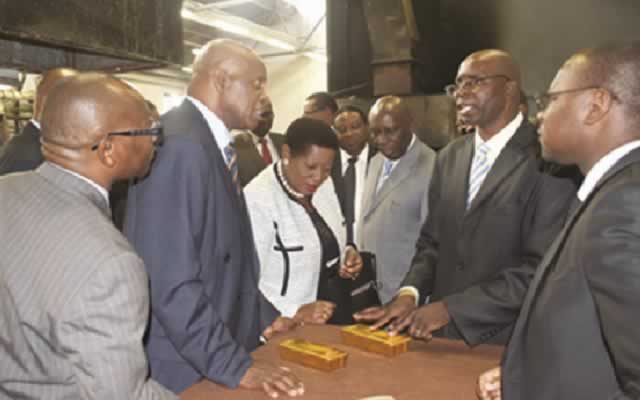Fidelity seeks London market re-accreditation


Fidelity Printers and Refiners senior manager refinery operations Mr Saul Ushe (second right) shows Finance and Economic Development Minister Patrick Chinamasa (second left), RBZ Deputy Governor Dr Charity Dhliwayo (third right) and Finance and Economic Development Deputy Minister Dr Samuel Undenge gold bars during a tour of Fidelity Printers early this year. Fidelity printers is seeking a return to the London Bullion market
Martin Kadzere Senior Business Reporter
FIDELITY Printers and Refiners has applied to be re-accredited by the London Bullion Market Association amid indications that Zimbabwe’s refined gold will surpass 10 tonnes.
A country has to refine a minimum 10 tonnes per annum to be re-admitted on the London market, the world’s biggest gold trading centre, according to the LBMA.
This means the country will have access to global gold buyers. At the moment, Zimbabwe is selling its gold through Rand Refineries and is charged 0,3 percent of the total earnings.
Zimbabwe was de-registered by LBMA after production fell to below three tonnes in 2008 as a result of delayed payments to miners by the RBZ, which was the sole buyer of the metal.
This resulted in many companies closing down, only to re-open in 2009 when the
RBZ deregulated the industry which, allowed gold miners to independently sell their bullion.
“We have made an initial application; basically advising them that we are most likely to refine more than 10 tonnes this year.
“But if we are to be accredited it may be next year because they will need to test our ability to refine and we have other requirements that we need to satisfy before we can be re-accredited,” said an official who spoke on condition of anonymity.
Fidelity Printers resumed gold refining in December since 2008. Before resuming gold refining, all gold was being exported unrefined and this negatively affected the local jewellery industry as it resorted to importing refined gold.
The resumption of refining came with a number of positives for the country, including providing feedstock for the resuscitation of the local jewellery industry as well as increasing the cost competitiveness of local products on both local and international markets.
In nine months to September, gold deliveries to Fidelity Printers and Refiners reached 9,8 tonnes with small scale miners contributing 2,4 tonnes while major producers delivered 7,4 tonnes.
Caledonia’s Blanket Mine delivered 1,36 tonnes, Mwana Africa’s owned Freda Rebecca delivered 1,35 tonnes while Metallon’s owned How Mine delivered 1,22 tonnes. Shamva Gold Mine delivered 553,7 kilogrammes.
Last year, Zimbabwe produced about 14 tonnes of gold, almost half of 27 tonnes produced in 1999.











Comments